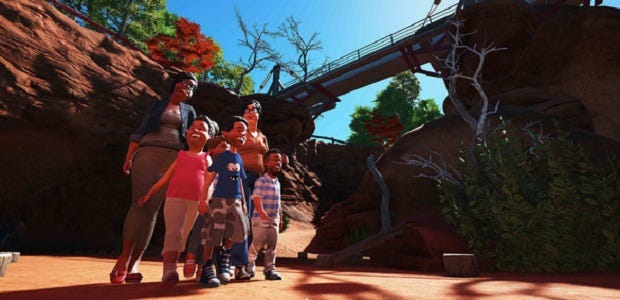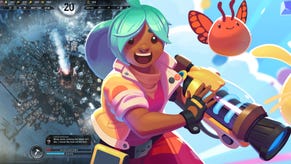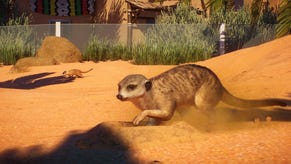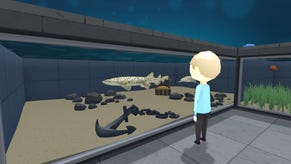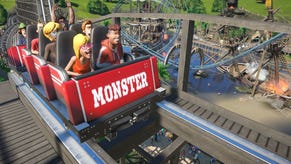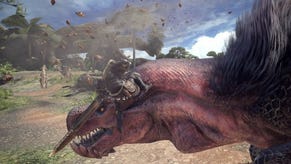Parks And Simulation: Planet Coaster
The mathematics of excitement
Planet Coaster's [official site] announcement barely caught my attention at all. There was a time when a new theme park management game might have tickled my fancy, but the subgenre hadn't been attractive for a while and I didn't expect Frontier's game to revive my interest. To do so, it'd have to be a proper simulation that paid as much attention to visitors as to rollercoasters, and it'd need to care about every aspect of its parks rather than focusing on some kind of first-person ride gimmick.
As the developer diaries started to appear, I realised that Planet Coaster was the game to revive my interest in park management, and that it was doing all of the things I'd hoped for and more.
Sitting down with two of the brains behind the game at Gamescom, I was in a happy place. The easiest interview in the world is the one in which every question is only half-formed before the interviewee has a positive response. I'd point at the screen, “Can you...?”
“Export the ride to Steam Workshop and allow other people to import it into their parks?”
“Yes. And can they...?”
“Edit the coaster that they've imported? Yep. They can strip it down and rebuilt it, borrow pieces of it for use in their own design, repaint it, tweak it.”
Sharing your creative output is the cherry rather than the cake – it'd be no use whatsoever if the creative tools weren't up to scratch – but the way in which Frontier have integrated importing and exporting is a fine example of the care that has gone into the game at every level.
Let's say you're building a park with two distinctly themed areas: one is family-friendly with fairytale characters, bright shops and rides that are gentle and pleasant; the other is for the teenagers and other thrill-seekers, with some kind of adrenaline-fuelled xtreme theme, and coasters that lead to more white knuckles than a necromancers' fight club. As the park grows in size, creating pathways that direct visitors toward areas where they can spend cash AND find the rides that they'll enjoy will become increasingly tricky. You might end up with a situation where you can no longer extend the kid-friendly area of the park without cutting into the Extreme Zone, and you might think that'd lead to demolition and reconstruction as you curse a lack of forward-thinking.
Happily, Planet Coaster allows you to drag a selection tool around an entire chunk of your park, rather than simply selecting individual buildings or rides, and cut that area so that it can be pasted elsewhere. Theoretically, you could move an entire zone, with minimal disruption, without having to waste time and money attempting to replicate work you've done previously. Everything from the undo button's long memory to this copy-paste function has been designed to encourage experimentation. Frontier want you to play with the tools they've provided.
And what tools they are. You can sculpt the land, using simple terraforming tools that can lead to extraordinary results. Mostly they'll be used to smooth an area prior to construction, but a little imagination can lead to coasters that scream down steep hillsides, or rattle along the edge of a sheer drop before plunging into the ground, emerging from a tunnel in the centre of the park. And the coaster in question has a fully simulated set of measurements dictating how exciting, scary and nauseating it is, taking into account the sharpness of turns, g-force, speed, drops, and all of the other mathematics of joy. You can ride it in first-person, handily receiving data about the appeal of the ride and how it changes during the course of a circuit as you see the whole thing play out in front of your virtual eyes. Thanks to the generosity of the undo button, you can then zoom back out and make whatever changes you feel would improve the experience, or tinker with it to ensure it suits the specific audience you're targeting, or that your park doesn't yet cater for in other areas.
Visitors all have their own tastes and budgets, and they'll navigate the park with a degree of intelligence, seeking out the things they enjoy or need, whether that's a bench to rest on or a toilet to pee in. Planet Coaster is a great game for people watching and does fantastic crowd simulation as well as neat path-finding for individuals. Again, the undo button allows you to play with all of this in real-time, throwing down an obstacle and watching people flow around it, or adding a new feature and watching as the AI redirects characters toward it should it fit their current desires.
There's a great deal of number-crunching happening as the simulation figures out everything from where a group of visitors might head next to the annoyance caused by a queue (and the possible alleviation that a supplementary fast-pass for queue skipping might bring about), and Frontier have done a great deal of work to make sure the result of that number-crunching is immediately apparent. That can be seen in the overexaggerated Sims-style animations with which visitors and staff inform you of their current mood or needs, and in the way that they'll react to changes around them.
What impresses me most about the design is that it seems to allow so much input and provides a great deal of output in return; that's not always the case with management games, or simulations. Here, you can change the colours of a food stall to fit in with your park's theme (or just to create something garish and/or unusual), and then you can attach pieces of scenery to that food stall to make it unique. You could create a waterfall or a Wild West themed area, or a neat utilitarian grid with perfectly appointed attractions and services. You could create winding paths through rolling hills, imperfect from a planning perspective, but beautiful to look at. And then you could tweak and polish until you have something that works aesthetically and practically.
While you're doing all of that, the visitors visits, the workers work, and the cash rolls in (and back out again). That people visibly react to the changes you make and that your bank balance then reflects those reactions allows the heft of the simulation to be felt in a way that is comprehensible and satisfying. If Planet Coaster's machinery is as effective as its portrayal of the theme park theme, it really will be the Skylines that this particular branch of management sims needed.
I've written a lot about the way the visual depiction of the park works in sync with the simulation rather than any back-of-the-box headline feature, and that's because it's hard to pick out a single feature when no area seems under-nourished. A lack of log flumes at release aside, Planet Coaster looks to be doing everything I'd want a theme park management game to do, and to be doing it all extremely well.
Planet Coaster is out November 17th.
